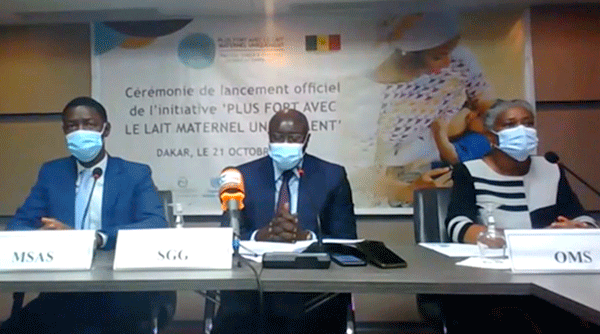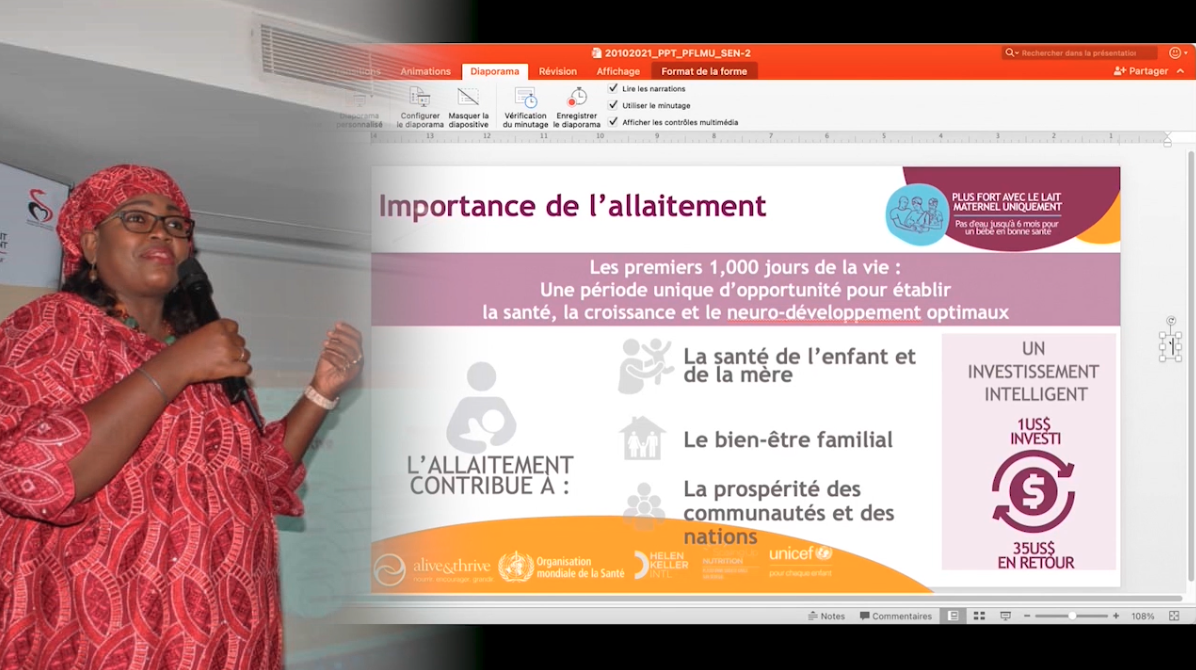Senegal has launched the Stronger With Breastmilk Only initiative, becoming the tenth country to do so in the West and Central Africa Region. The initiative is a collaboration supported by UNICEF, the World Health Organization (WHO), and Alive & Thrive, to increase the rate of exclusive breastfeeding and to strengthen breastfeeding programs and policies.

The launch came after months of work by the government, international and national infant and young child feeding partners, including Alive & Thrive. The collaboration involved analyzing the national situation and developing a strategic and budgeted action plan for the Stronger With Breastmilk Only initiative in Senegal.
“Senegal has made significant efforts in the area of breastfeeding,” said Dr. Lucile Imboua, the WHO Representative to Senegal, in her remarks to stakeholders participating in-person in Dakar and online. “The national exclusive breastfeeding rate increased to 46% in 2018. However, the recent decrease in the rate to 41% in 2019 as well as the risks associated with the COVID-19 pandemic show the need to increase our efforts.”
A variety of stakeholders participated in the October launch, including representatives of the government, health workers, professional organizations, technical experts, researchers, UN agencies, NGOs and civil society.

“Be assured that the government of Senegal is committed to reaching the 50% goal by 2025,” said Alyoune Badara Diop, adjunct secretary general of the government, who officiated the launch. “This cannot be attained without the strong participation of all stakeholders.”
In a presentation preceding the launch, Nafissatou Ba, a nutrition expert at the National Nutrition Development Council (CNDN), presented an overview of the nutrition situation for children in Senegal and emphasized the importance of breastfeeding.
Nearly 3,000 infants in Senegal under the age of two years and 162 mothers die annually due to suboptimal breastfeeding practices, according to the Alive & Thrive Cost of Not Breastfeeding tool. Economic impacts are similarly significant: Senegal loses $352 million annually due to not breastfeeding according to recommendations.
The main obstacle to exclusive breastfeeding is the practice of giving water to infants under six months of age, which affects four out of 10 infants.

To reach the 2025 global goal of at least 50% exclusive breastfeeding rate, Senegal can take advantage of the Stronger With Breastfeeding Only social and behavior change strategies and resources.
“I appeal to all stakeholders in this initiative to work together to support exclusive breastfeeding,” said Alassane Mbengue, the general secretary of health at the Ministry of Health and Social Action. “All the Ministry of Health and Social Action’s services, in particular the directorate of mother and child health, will do everything possible for the success of the initiative.”
The initiative’s progress will be closely monitored to ensure national agencies implement activities to increase exclusive breastfeeding, said Aita Cisse Sarr, Alive & Thrive regional senior MIYCN advisor.
“The Stronger With Breastmilk Only initiative puts a variety of technical assistance and resources in service of mothers and families in Senegal,” Sarr said. “With this support, we are confident that the rate of exclusive breastfeeding will increase.”
